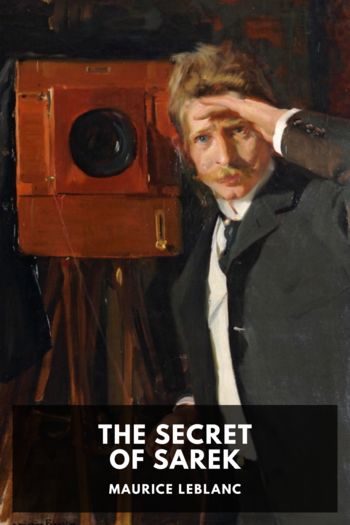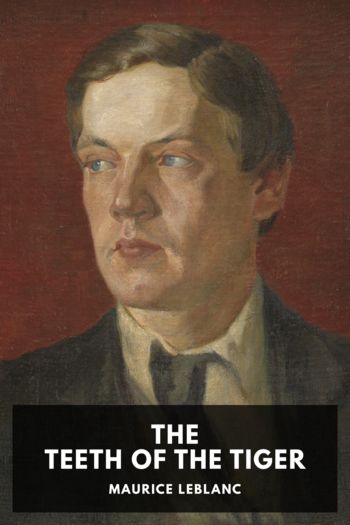The Secret of Sarek, Maurice Leblanc [the ebook reader .txt] 📗

- Author: Maurice Leblanc
Book online «The Secret of Sarek, Maurice Leblanc [the ebook reader .txt] 📗». Author Maurice Leblanc
“Perhaps he’s ill?” Véronique suggested.
“No, François is never ill.”
“What then?”
“I don’t know.”
“But aren’t you afraid?” asked Véronique, who was already becoming frightened.
“For him, no … but for your father. Maguennoc said that I oughtn’t to leave him. It’s he who is threatened.”
“But François is there to defend him; and so is M. Maroux, his tutor. Come, answer me: what do you imagine?”
After a moment’s pause, Honorine shrugged her shoulders.
“A pack of nonsense! I get absurd, yes, absurd things into my head. Don’t be angry with me. I can’t help it: it’s the Breton in me. Except for a few years, I have spent all my life here, with legends and stories in the very air I breathed. Don’t let’s talk about it.”
The Isle of Sarek appears in the shape of a long and undulating tableland, covered with ancient trees and standing on cliffs of medium height than which nothing more jagged could be imagined. It is as though the island were surrounded by a reef of uneven, diversified lacework, incessantly wrought upon by the rain, the wind, the sun, the snow, the frost, the mist and all the water that falls from the sky or oozes from the earth.
The only accessible point is on the eastern side, at the bottom of a depression where a few houses, mostly abandoned since the war, constitute the village. A break in the cliffs opens here, protected by the little jetty. The sea at this spot is perfectly calm.
Two boats lay moored to the quay.
Before landing, Honorine made a last effort:
“We’re there, Madame Véronique, as you see. Now is it really worth your while to get out? Why not stay where you are? I’ll bring your father and your son to you in two hours’ time and we’ll have dinner at Beg-Meil or at Pont-l’Abbé. Will that do?”
Véronique rose to her feet and leapt on to the quay without replying. Honorine joined her and insisted no longer:
“Well, children, where’s young François? Hasn’t he come?”
“He was here about twelve,” said one of the women. “Only he didn’t expect you until tomorrow.”
“That’s true enough … but still he must have heard me blow my horn. However, we shall see.”
And, as the man helped her to unload the boat, she said:
“I shan’t want all this taken up to the Priory. Nor the bags either. Unless … Look here, if I am not back by five o’clock, send a youngster after me with the bags.”
“No, I’ll come myself,” said one of the seamen.
“As you please, Corréjou. Oh, by the way, where’s Maguennoc?”
“Maguennoc’s gone. I took him across to Pont-l’Abbé myself.”
“When was that, Corréjou?”
“Why, the day after you went, Madame Honorine.”
“What was he going over for?”
“He told us he was going … I don’t know where. … It had to do with the hand he lost … a pilgrimage. …”
“A pilgrimage? To Le Faouet, perhaps? To St. Barbe’s Chapel?”
“That’s it … that’s it exactly: St. Barbe’s Chapel, that’s what he said.”
Honorine asked no more. She could no longer doubt that Maguennoc was dead. She moved away, accompanied by Véronique, who had lowered her veil; and the two went along a rocky path, cut into steps, which ran through the middle of an oak-wood towards the southernmost point of the island.
“After all,” said Honorine, “I am not sure—and I may as well say so—that M. d’Hergemont will consent to leave. He treats all my stories as crotchets, though there’s plenty of things that astonish even him. …”
“Does he live far from here?” asked Véronique.
“It’s forty minutes’ walk. As you will see, it’s almost another island, joined to the first. The Benedictines built an abbey there.”
“But he’s not alone there, is he, with François and M. Maroux?”
“Before the war, there were two men besides. Lately, Maguennoc and I used to do pretty well all the work, with the cook, Marie Le Goff.”
“She remained, of course, while you were away?”
“Yes.”
They reached the top of the cliffs. The path, which followed the coast, rose and fell in steep gradients. On every hand were old oaks with their bunches of mistletoe, which showed among the as yet scanty leaves. The sea, grey-green in the distance, girded the island with a white belt.
Véronique continued:
“What do you propose to do, Honorine?”
“I shall go in by myself and speak to your father. Then I shall come back and fetch you at the garden-gate; and in François’ eyes you will pass for a friend of his mother’s. He will guess the truth gradually.”
“And you think that my father will give me a good welcome?”
“He will receive you with open arms, Madame Véronique,” cried the Breton woman, “and we shall all be happy, provided … provided nothing has happened … It’s so funny that François doesn’t run out to meet me! He can see our boat from every part of the island … as far off as the Glenans almost.”
She relapsed into what M. d’Hergemont called her crotchets; and they pursued their road in silence. Véronique felt anxious and impatient.
Suddenly Honorine made the sign of the cross:
“You do as I’m doing, Madame Véronique,” she said. “The monks have consecrated the place, but there’s lots of bad, unlucky things remaining from the old days, especially in that wood, the wood of the Great Oak.”
The old days no doubt meant the period of the Druids and their human sacrifices; and the two women were now entering a wood in which the oaks, each standing in isolation on a mound of moss-grown stones, had a look of ancient gods, each with his own altar, his mysterious cult and his formidable power.
Véronique, following Honorine’s example, crossed herself and could not help shuddering as she said:
“How melancholy it is! There’s not a flower on this desolate plateau.”
“They grow most wonderfully when one takes the trouble. You shall see Maguennoc’s, at the end of the island, to the right of the Fairies’ Dolmen … a place called the Calvary of the Flowers.”
“Are they lovely?”
“Wonderful, I tell you. Only he goes himself to get the mould from certain places. He





Comments (0)